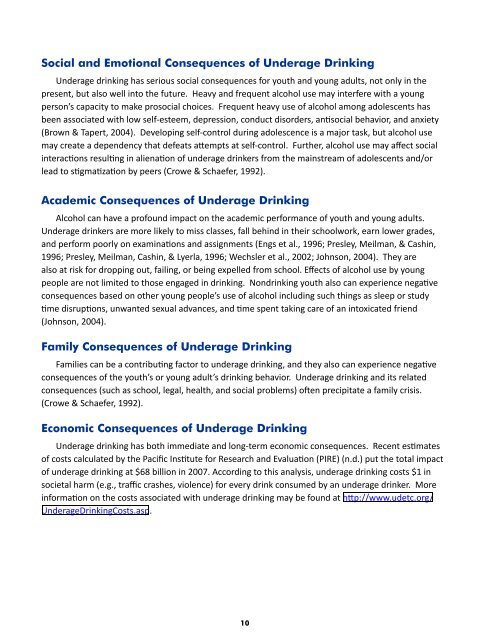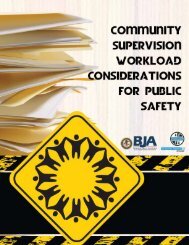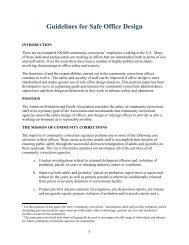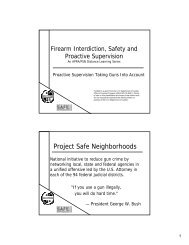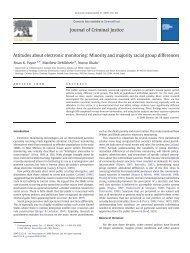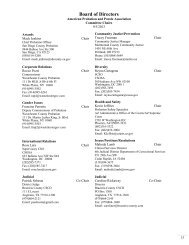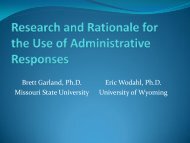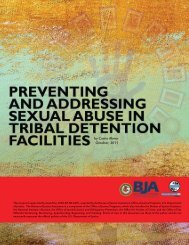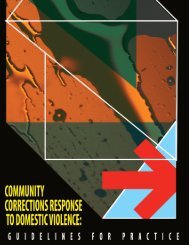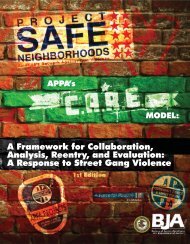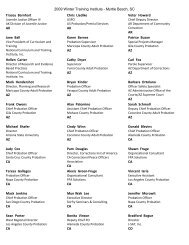Intervention Principles and Practice Guidelines for - Underage ...
Intervention Principles and Practice Guidelines for - Underage ...
Intervention Principles and Practice Guidelines for - Underage ...
You also want an ePaper? Increase the reach of your titles
YUMPU automatically turns print PDFs into web optimized ePapers that Google loves.
Social <strong>and</strong> Emotional Consequences of <strong>Underage</strong> Drinking<br />
<strong>Underage</strong> drinking has serious social consequences <strong>for</strong> youth <strong>and</strong> young adults, not only in the<br />
present, but also well into the future. Heavy <strong>and</strong> frequent alcohol use may interfere with a young<br />
person’s capacity to make prosocial choices. Frequent heavy use of alcohol among adolescents has<br />
been associated with low self-esteem, depression, conduct disorders, antisocial behavior, <strong>and</strong> anxiety<br />
(Brown & Tapert, 2004). Developing self-control during adolescence is a major task, but alcohol use<br />
may create a dependency that defeats attempts at self-control. Further, alcohol use may affect social<br />
interactions resulting in alienation of underage drinkers from the mainstream of adolescents <strong>and</strong>/or<br />
lead to stigmatization by peers (Crowe & Schaefer, 1992).<br />
Academic Consequences of <strong>Underage</strong> Drinking<br />
Alcohol can have a profound impact on the academic per<strong>for</strong>mance of youth <strong>and</strong> young adults.<br />
<strong>Underage</strong> drinkers are more likely to miss classes, fall behind in their schoolwork, earn lower grades,<br />
<strong>and</strong> per<strong>for</strong>m poorly on examinations <strong>and</strong> assignments (Engs et al., 1996; Presley, Meilman, & Cashin,<br />
1996; Presley, Meilman, Cashin, & Lyerla, 1996; Wechsler et al., 2002; Johnson, 2004). They are<br />
also at risk <strong>for</strong> dropping out, failing, or being expelled from school. Effects of alcohol use by young<br />
people are not limited to those engaged in drinking. Nondrinking youth also can experience negative<br />
consequences based on other young people’s use of alcohol including such things as sleep or study<br />
time disruptions, unwanted sexual advances, <strong>and</strong> time spent taking care of an intoxicated friend<br />
(Johnson, 2004).<br />
Family Consequences of <strong>Underage</strong> Drinking<br />
Families can be a contributing factor to underage drinking, <strong>and</strong> they also can experience negative<br />
consequences of the youth’s or young adult’s drinking behavior. <strong>Underage</strong> drinking <strong>and</strong> its related<br />
consequences (such as school, legal, health, <strong>and</strong> social problems) often precipitate a family crisis.<br />
(Crowe & Schaefer, 1992).<br />
Economic Consequences of <strong>Underage</strong> Drinking<br />
<strong>Underage</strong> drinking has both immediate <strong>and</strong> long-term economic consequences. Recent estimates<br />
of costs calculated by the Pacific Institute <strong>for</strong> Research <strong>and</strong> Evaluation (PIRE) (n.d.) put the total impact<br />
of underage drinking at $68 billion in 2007. According to this analysis, underage drinking costs $1 in<br />
societal harm (e.g., traffic crashes, violence) <strong>for</strong> every drink consumed by an underage drinker. More<br />
in<strong>for</strong>mation on the costs associated with underage drinking may be found at http://www.udetc.org/<br />
<strong>Underage</strong>DrinkingCosts.asp.<br />
10


